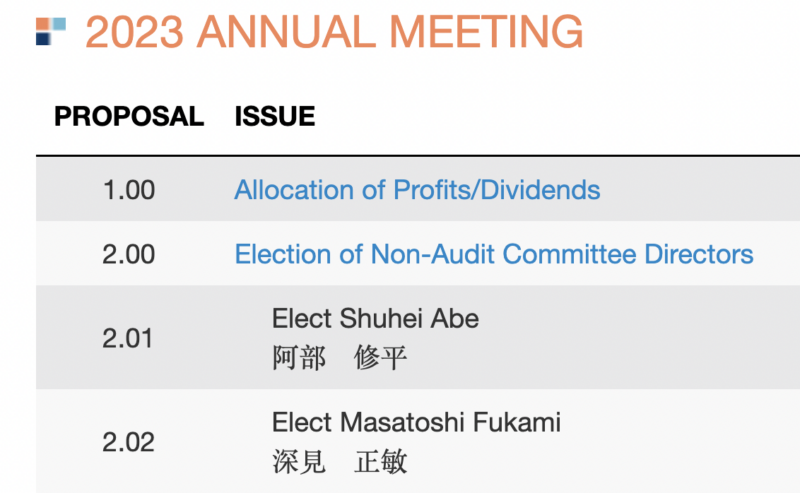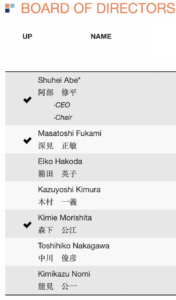
Nearly a decade after Abenomics spurred a flurry of overseas interest in the Nikkei, international investors are once again targeting Japan. In addition to corporate governance reforms that have brought the market in line with global peers, investors are being lured by the prospect of cheap assets.
Whatever the reason for the influx, the impact on shareholder activism has been noticeable – the number of shareholder proposals has sharply increased, featuring a wider range of topics and proponents than ever before. With proxy season around the corner, expect to see even more shareholder proposals on climate, capital efficiency, and governance, and a greater willingness amongst investors (including Japanese institutions) to oppose management.
With thousands of AGMs occurring in the next month, Glass Lewis’ Tokyo-based team is here to help. Our Proxy Papers, which now feature Kanji-language director names within the report, provide the information you need to make your vote decision, with industry-leading 20-day average lead times for Japan. This excerpt from our client-exclusive 2023 Proxy Season Preview sets out the key trends for the upcoming proxy season. Get in touch to learn more.
GROW@glasslewis.com (Institutional Investors) | ENGAGE@glasslewis.com (Corporate Issuers)
Capital Efficiency
Despite recent governance improvements, the Japanese market still faces issues related to capital efficiency and profitability, such as sluggish ROE growth and an increase in cash and deposits held. Approximately half of the listed companies in the prime market and 60% in the standard market have ROE below 8% and P/B ratios below 1x, indicating that they are facing issues in terms of return on capital and growth potential. In particular, it is noteworthy that there is a greater focus on responding to companies with P/B ratios below 1x on an ongoing basis.
These issues have prompted an influx of foreign bargain hunters, and regulatory efforts aimed at improving efficiency. On March 31, 2023, the Tokyo Stock Exchange published “Measures to Achieve Management Conscious of Cost of Capital and Stock Price”, encouraging the boards of Prime and Standard Market-listed companies to examine and formulate policies, targets, plan periods, and specific initiatives to improve cost of capital and return on capital, along with P/B ratio and market valuation. The details of these initiatives, along with the current assessment, should be disclosed to investors in an easy-to-understand manner.
This regulatory push follows a significant increase in shareholder pressure over capital management policies. Last year we saw a relative outpouring of capital management resolutions, with investors seeking to apply particularly pointed pressure around expanded dividends and larger share repurchase programs at firms perceived to be overly cautious and inefficiently structured, along with an increased focus on reducing cross-shareholdings.
What it means for Proxy Season 2023
- Institutional investors are likely to address the issue of improving corporate value over the medium term in their engagements with companies with P/B ratios below 1x.
- In addition, activists and others are likely to intensify their efforts to reach out to the companies in question and demand improvements in the form of shareholder proposals.
Climate Proposals
The recent rise in Japanese activism has not been limited to capital efficiency. There was also a notable increase in climate-related shareholder proposals that went to a vote at Japanese companies in 2022. These shareholder proposals came not only from environmental NGOs, but also from global institutional investors and Japanese local governments.
In prior years, the driving force behind climate-related proposals in Japan was the Australian NGO Market Forces. However, in 2022 the proponents broadened to include global institutional investors and Japanese local governments. Notably, a group that included Man Group, Amundi, and HSBC filed three resolutions at Electric Power Development Co. (J-POWER) – marking the first time that a Japanese climate resolution was filed by institutional investors.
What it Means for Proxy Season 2023
- The focus on climate change and other environmental-related issues remains strong, including from institutional investors. Amundi and HSBC have once again submitted a proposal to J-POWER, and another institutional climate proposal has been submitted at Toyota Motor Corp., this time by a group including Kapitalforeningen MP Invest, Storebrand Asset Management AS, and APG Asset Management NV.
- As foreign institutions get more comfortable with the Japanese shareholder proposal structure, the language of these resolutions may get more refined; and as Japanese investors get more comfortable with seeing these proposals on the ballot, support may continue to increase.
Gender Diversity
Board composition is another area where evolving societal expectations are having an impact. Pressure has come from both regulators, with Prime Minister Kishida indicating a goal of at least 30% board gender diversity at top-tier listed 2030, and investors. Moreover, it’s not only global investors making the push — Japanese domestic investors have introduced a policy of requiring female directors. That was illustrated in March of this year at Canon Inc.’s AGM, where the re-election of CEO Fujio Mitarai (御手洗 冨士夫) received only 50.59% support, reportedly due to lack of board gender diversity.
What it means for Proxy Season 2023
- While many investors have previously made market-specific exceptions to their board gender diversity policies, the results at Canon and our engagement discussions indicate that Japanese companies are no longer an exception.
- Companies with zero female directors should expect a low level of support for reappointment of top management.
Looking for More?
With thousands of meetings taking place in the next month, keeping up with Japan’s proxy season can be a major challenge for investors. Glass Lewis’ Tokyo-based team is here to help. Our Proxy Papers, which now feature Kanji-language director names inside the report, provide the information you need to make your vote decision, with industry-leading 20-day average lead times for Japan.
For more discussion from our local market experts, you can listen to our Season Preview Webinar (in Japanese). The webinar presentation is available in both Japanese and English.
Glass Lewis clients can also access our 2023 Japan Proxy Season Preview, from which this post was excerpted, on Viewpoint and Governance Hub.
- Institutional Clients: Read the Season Preview in Viewpoint
- Corporate Issuer Clients: Read the Season Preview in Governance Hub
Not a Glass Lewis client? Get in touch.
GROW@glasslewis.com (Institutional Investors) | ENGAGE@glasslewis.com (Corporate Issuers)

